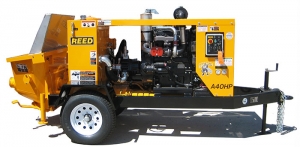Concrete pumps have become an integral part of modern construction. Whether working on a high-rise building, a driveway, or a complex industrial structure, having the right concrete pump is vital for efficiency and quality. Selecting the right equipment ensures your project proceeds smoothly and meets deadlines and budgets.
Finding concrete pumps for sale is not difficult, but choosing the right one for your needs requires careful consideration. From understanding the different types available to evaluating performance specifications, this guide will walk you through everything you need to know to make an informed decision.
Understanding Concrete Pump Types
Not all concrete pumps are created equal. Depending on the nature and scale of your project, you’ll likely need one of the following pump types.
1. Boom Pumps
Boom pumps, also known as truck-mounted pumps, are highly versatile and efficient. They feature robotic arms (or booms) that can extend to pour concrete into hard-to-reach areas.
Advantages of Boom Pumps:
- Ideal for large-scale construction projects.
- It can cover significant distances and heights.
- Reduce labour requirements by automating the pouring process.
Common Use Cases: High-rise buildings, large industrial slabs, and bridge infrastructure projects.
2. Line Pumps
Line pumps are typically mounted on a trailer or truck and use hoses to direct concrete to specific locations. They are compact, making them ideal for projects with limited space.
Advantages of Line Pumps:
- Cost-effective and easier to manoeuvre.
- Works well for smaller-scale jobs.
- Suitable for tight spaces or congested job sites.
Common Use Cases: Residential projects, driveways, and sidewalks.
3. Specialty Pumps
Speciality pumps include skid-mounted or pumps designed for specific needs, such as high-pressure concrete placement. These pumps cater to niche requirements that standard boom or line pumps can’t address.
Common Use Cases: Underground construction, tunnelling, and specialized industrial setups.
Key Factors to Consider
Before purchasing a concrete pump, consider your project’s unique requirements. These factors will guide you to the most suitable choice.
1. Project Size
The scale of your project plays a significant role in determining the type of pump you need. Large-scale projects, such as multi-story buildings, demand high-capacity boom pumps, whereas smaller projects, like patios or pools, will do well with a line pump.
2. Concrete Volume
How much concrete does your project require? If your project involves high concrete volumes, you’ll need a pump with sufficient output capacity to maintain efficiency and avoid delays. Pumps with higher flow rates are better suited for such demands.
3. Site Accessibility
Is your job site easy to access, or does it have obstacles like narrow driveways or restricted areas? Boom pumps can quickly pour concrete into difficult-to-reach areas, while line pumps are better for compact spaces. Assess the layout of your construction site before making a decision.
4. Budget
Cost considerations go beyond the pump purchase itself. Factor in transportation, maintenance, and operating costs. Don’t forget to explore used concrete pumps for sale as a budget-friendly option if you’re working with limited funds.
Evaluating Pump Specifications
Concrete pumps have various performance specifications that determine their suitability for different tasks. Understanding these specifications is critical to finding the best fit.
1. Flow Rate
The flow rate indicates how much concrete the pump can deliver per hour. For example, a boom pump with a high flow rate is ideal for a large-scale construction site, while a lower flow rate suffice for smaller jobs.
2. Pressure
Concrete pumps operate under pressure to push the material through hoses or booms. Higher pressure is required for projects involving dense materials or long-distance pumping. Check the pump’s pressure rating to ensure compatibility with your project’s needs.
3. Horsepower
Horsepower impacts the overall efficiency of the pump. A higher horsepower motor provides greater pumping power and flexibility. This is particularly important for large-scale projects where maintaining consistent performance is key.
Brand and Supplier Reputation
The reputation of the pump’s manufacturer and supplier is an essential consideration. A well-established brand often indicates higher reliability, better performance, and robust customer support. Similarly, working with reputable suppliers ensures access to warranties, services, and spare parts when needed.
Tips for Choosing a Reliable Brand or Supplier:
- Read customer reviews and testimonials.
- Check if they offer a warranty for the pump.
- Look for additional services like onsite support or operator training.
- Ensure easy availability of replacement parts.
The Bottom Line
When looking for concrete pumps for sale, the right choice depends on aligning your project requirements with the pump’s features and capabilities. Here’s a quick recap to guide your decision-making process:
- Understand the different pump types like boom, line, and speciality pumps.
- Assess the project size, volume of concrete needed, site accessibility, and budget to narrow your options.
- Evaluate pump specifications such as flow rate, pressure, and horsepower.
- Choose a reliable brand and supplier to ensure long-term reliability and support.
By taking these steps, you can ensure a seamless and efficient workflow for your construction project, saving time and labour costs. Whether building a residential project or working on an industrial complex, the right concrete pump can make all the difference.
Are you looking for quality concrete pumps for sale? Start your search today and invest in equipment that makes your projects successful!

